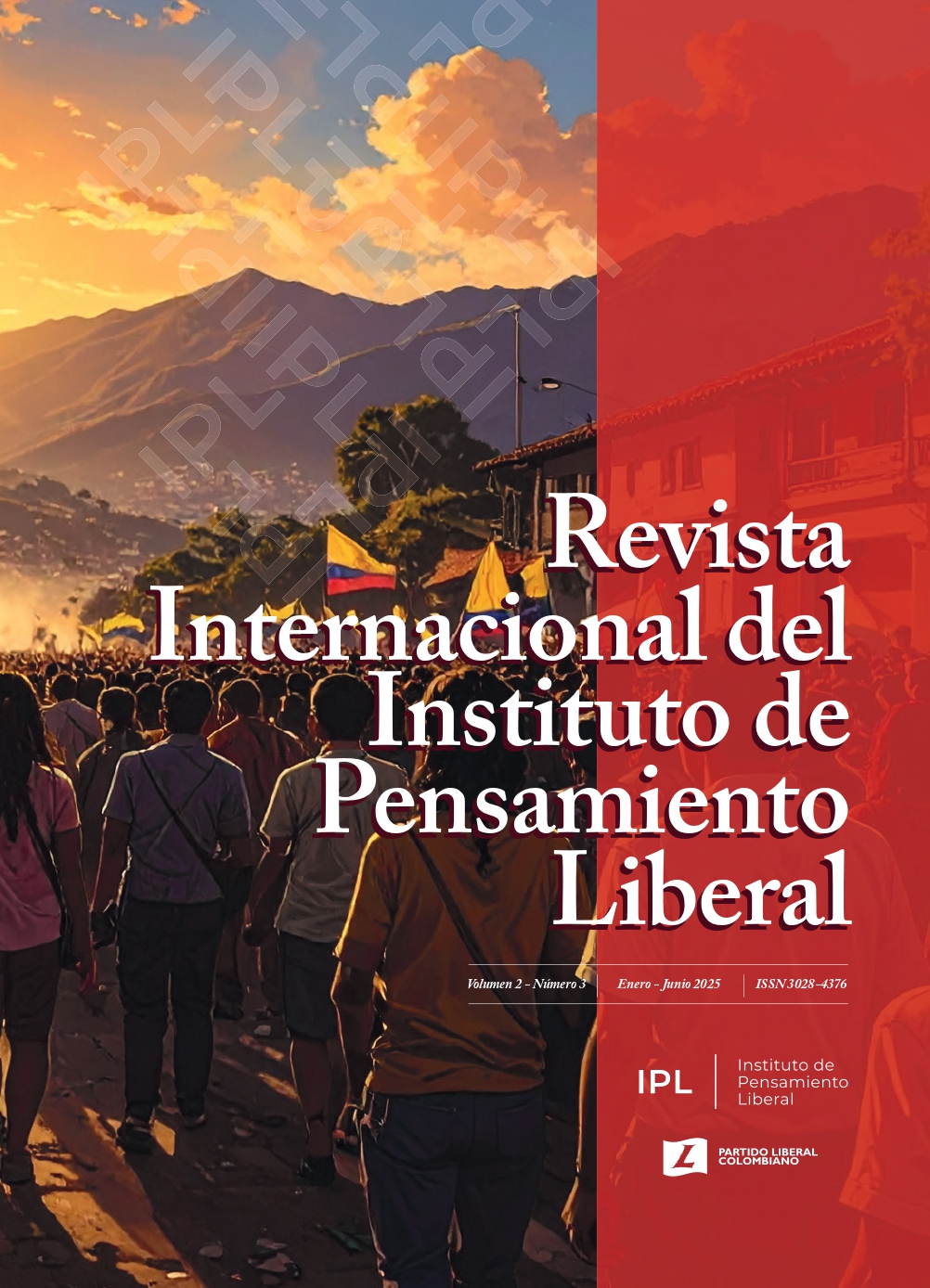From Morena’s Success in Mexico to the Challenges of the Pacto Histórico in Colombia: A Comparative Reflection on Three Institutional Determinants of Party Consolidation
DOI:
https://doi.org/10.51660/Keywords:
political parties, politicalinstitutions, party consolidation, México, ColombiaAbstract
Objective. To analyze the phenomenon of party consolidation through a comparison between the Morena party in Mexico and the Pacto Histórico coalition in Colombia. Method. A reflective comparative approach is employed, based on the identification of institutional trends and patterns, to describe three key determinants of the functioning and electoral exchanges of political parties in both cases. Results. The analysis reveals similarities and differences in the consolidation processes of Morena and the Pacto Histórico, highlighting institutional, historical, and contextual factors that influence their capacity for party structuring and electoral performance
Conclusion. Based on a critical interpretation of Morena's background and the ongoing evolution of the Pacto Histórico, the study offers a balanced assessment of the scope and limitations of both organizations' consolidation over the past decade.
Downloads
References
Auyero, J. (Comp.) (1997). ¿Favores por votos? Estudios sobre clientelismo político contemporáneo. Loisada.
Budge, I. & Farlie, D. (1983). Explaining and Predicting Elections: Issue Effects a Strategies in Twenty-three Democracies. Allen & Unwin.
Castiblanco, J. (2021). Diferenciación programática de las propuestas de campaña presidenciales bajo condiciones de polarización en México y Colombia en 2018. [Tesis de maestría]. Universidad Nacional Autónoma de México. https://tesiunam.dgb.unam.mx/F/FYXSBCC6K7CDKL2596UC1HFJXCNG4F7ITEP3FV87M82QVYNFLU-02312?func=service&doc_library=TES01&doc_number=000815762&line_number=0001&func_code=WEB-FULL&service_type=MEDIA.
Cox, G. Making votes count. Strategic Coordination in the World’s Electoral Systems. Cambridge University Press. https://doi.org/10.1017/CBO9781139174954.
Damore, D. (2004). “The dynamics of issue ownership in presidential campaigns”. Political Research Quarterly, 57, 391-397. https://doi.org/10.2307/3219849.
Dimaggio, P. y Powell, W. (1983). “The Iron Cage Revisited: Institutional Isomorphism and Collective Rationality in Organizational Fields”. American Sociological Review, 48(2), 147-160. https://doi.org/10.2307/2095101.
Downs, A. (1957). An Economic Theory of Democracy. Harper & Row Publishers.
Fiorina, M. (1981). Retrospective Voting in American National Elections. Yale University Press.
Gay, R. (1997). “Entre el clientelismo y el universalismo. Reflexiones sobre la política popular en el Brasil urbano”. En Auyero, J. (Comp.) ¿Favores por votos? Estudios sobre clientelismo político contemporáneo. Loisada, 65-92.
Harguindéguy, J. (2015). Análisis de políticas públicas. Técnos.
Instituto Nacional Electoral (INE) (2015). Sistema de Consulta de la Estadística de las Elecciones Federales 2014-2015. http://siceef.ine.mx/camdiputados.html?p%C3%A1gina=1.
Instituto Nacional Electoral (INE) (2018). Cómputos Distritales 2018. Elecciones Federales. https://computos2018.ine.mx/#/presidencia/nacional/1/1/1/1.
Instituto Nacional Electoral (INE) (2021). Cómputos Distritales 2021. Elecciones Federales. https://computos2021.ine.mx/votos-distrito/mapa.
Instituto Nacional Electoral (INE) (2024). Informa INE que se computaron 60 millones 115 mil 184 votos en la elección presidencial. https://centralelectoral.ine.mx/2024/06/09/informa-ine-que-se-computaron-60-millones-115-mil-184-votos-en-la-eleccion-presidencial/.
Katz, R. S., & Mair, P. (1995). Changing Models of Party Organization and Party Democracy: The Emergence of the Cartel Party. Party Politics, 1(1), 5-28. https://doi.org/10.1177/1354068895001001001.
Key, V. O. (1966). The Responsible Electorate: Rationality in Presidential Voting 1936-1969. Harvard University Press.
Kitschelt, H. & Wilkinson, S. (2007). “Citizen-politician linkages: an introduction”. In Kitschelt, H. & Wilkinson, S. (Eds.), Patrons, Clients, and Policies. Patterns of Democratic Accountability and Political Competition. Cambridge University Press, 1-49.
Kitschelt, H., Hawkins, K., Rosas, G. & Zechmeinster. E. (2010). “Patterns of Programmatic Party Competition in Latin America”. In Kitschelt, H. Hawkins, K., Luna, J., Rosas, G. & Zechmeister, E., Latin American Party Systems. New York, Cambridge University Press, pp. 14-58.
Mainwaring, S., & Scully, T. R. (2009). La institucionalización de los sistemas de partido en la América Latina. América Latina Hoy, 16. https://doi.org/10.14201/alh.2107
North, D. (2012). “Los andamios que el ser humano erige”. En Rodolfo Vergara (Comp.) Organizaciones e instituciones. Siglo Veintiuno Editores y Escuela de Administración Pública del Distrito Federal, 142-162.
Petrocik, J. (1996). Issue ownership in presidential elections, with a 1980 case study. American Journal of Political Science, 40, 825-850. https://doi.org/10.2307/2111797.
Registraduría Nacional del Estado Civil (RNEC) (2018). Resultado de preconteo 2ª vuelta. https://elecciones1.registraduria.gov.co/pre_pres_2018/resultados/2html/resultados.html.
Registraduría Nacional del Estado Civil (RNEC) (2022a). Resultados de las elecciones a Congreso de la República 2022. https://observatorio.registraduria.gov.co/historico-resultados.html.
Registraduría Nacional del Estado Civil (RNEC) (2022b). Resultado de las elecciones presidenciales 2022. https://observatorio.registraduria.gov.co/historico-resultados.html.
Registraduría Nacional del Estado Civil (RNEC) (2023). Elecciones territoriales 2023. https://resultadosprec2023.registraduria.gov.co/.
Sartori, G. (2005). Partidos y sistemas de partidos. Alianza Editorial.
Stokes, S. (2001). Mandates and Democracy. Neoliberalism by Surprise in Latin America. Cambridge University Press. https://doi.org/10.1017/CBO9780511612978.
Vommaro, G. y H. Combes (2016). El clientelismo político desde 1950 hasta nuestros días. Siglo Veintiuno.
Walgrave, S., Lefevere, J. & Tresch, A. (2012). “The Associative Dimension of Issue Ownership”. Public Opinion Quarterly, 4(76), 771-782.
Downloads
Published
Issue
Section
License
Copyright (c) 2025 Julio César Castiblanco Sierra (Autor/a)

This work is licensed under a Creative Commons Attribution-NonCommercial 4.0 International License.




